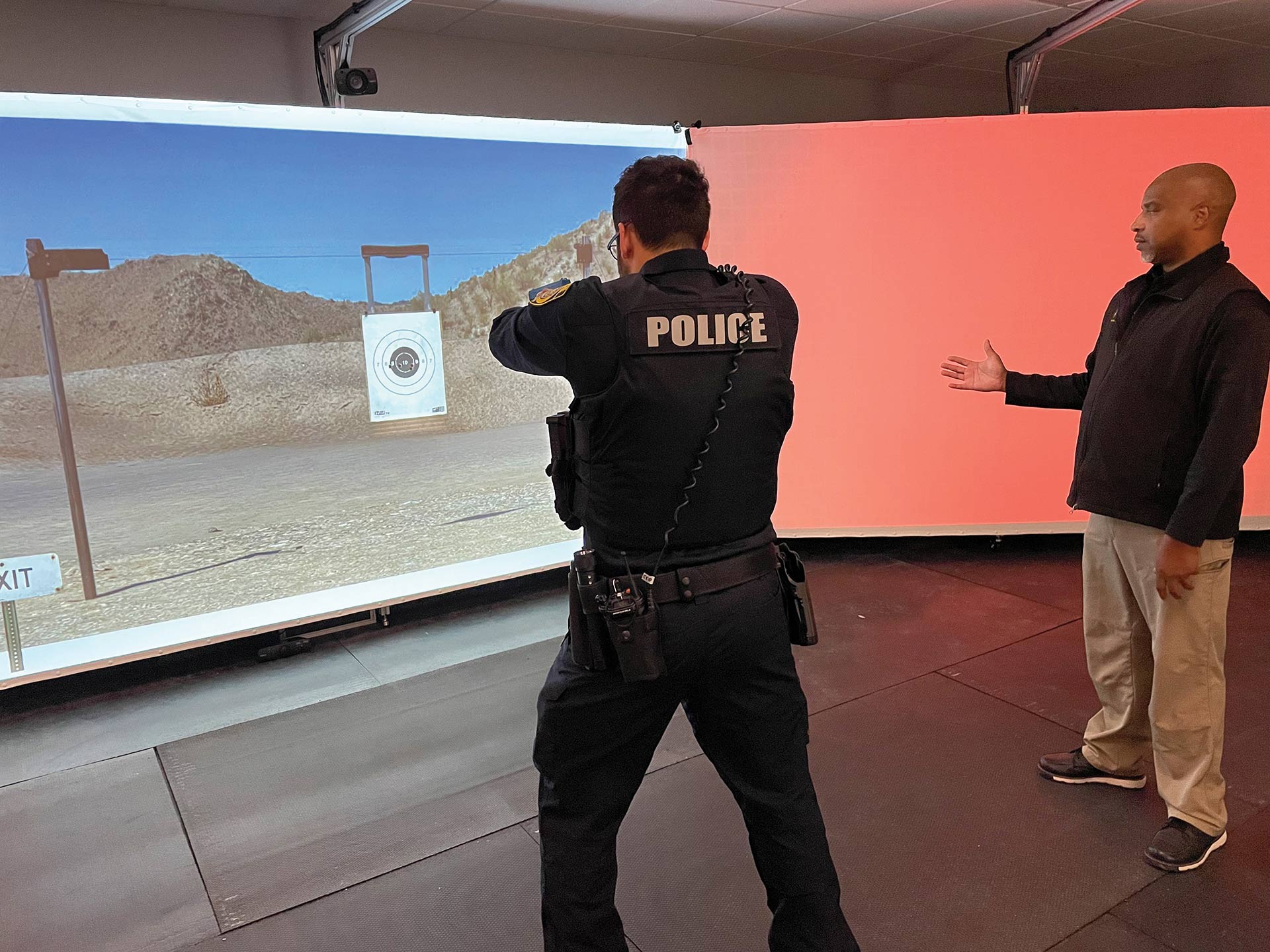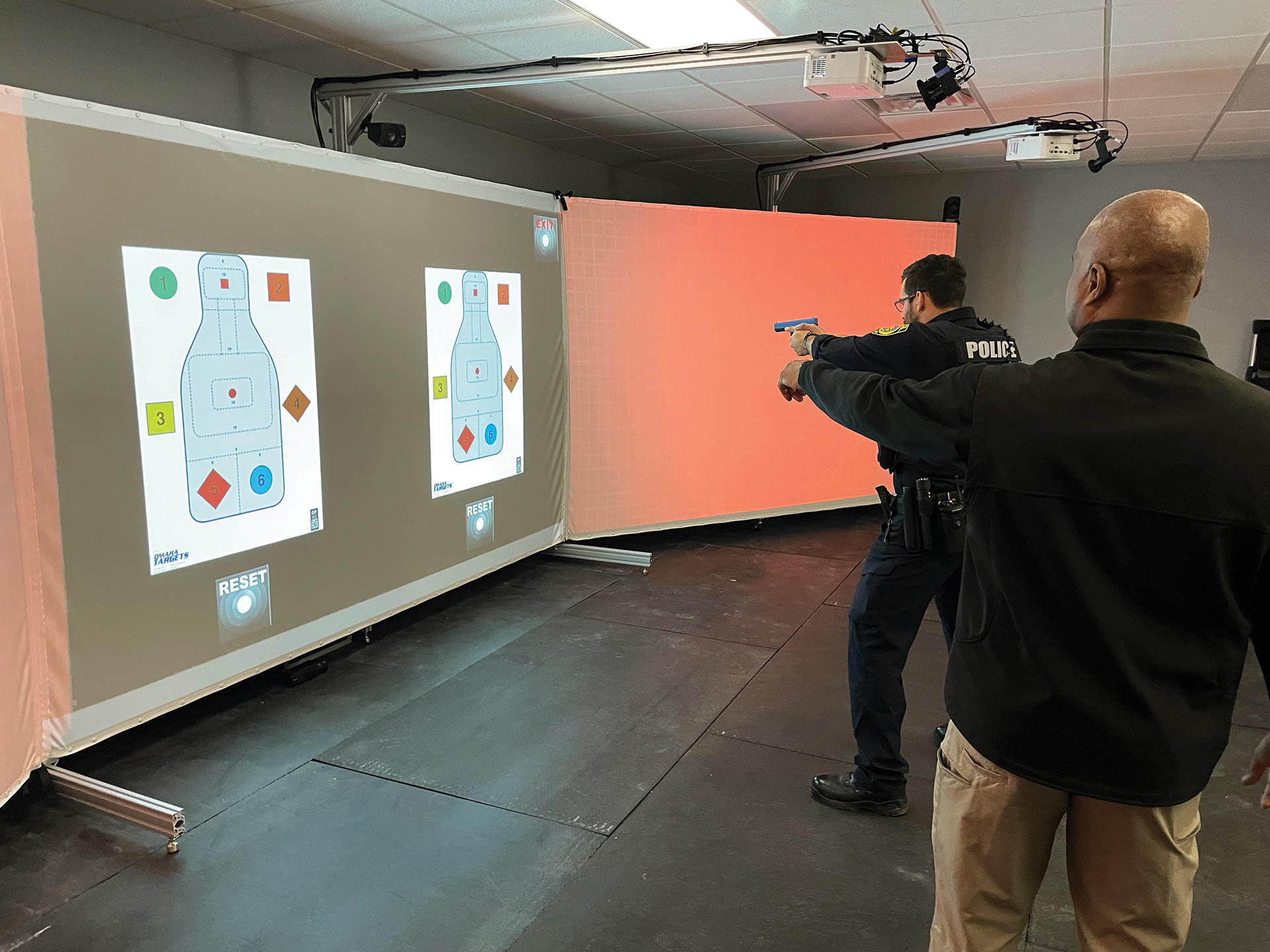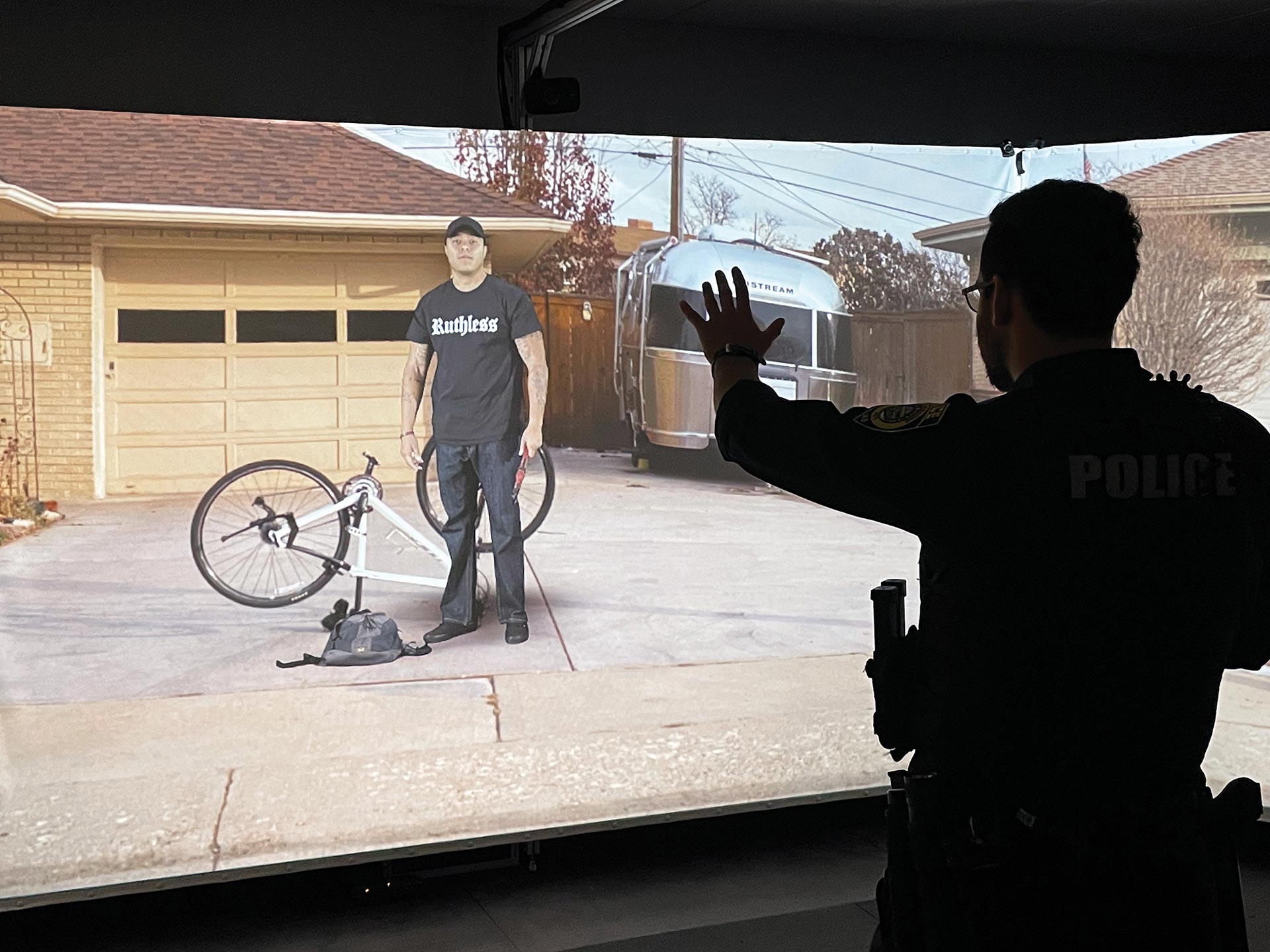
Another night shift. Another domestic call, burglary in progress or a car stop on a dark street. Are you confronted by a compliant suspect, a belligerent and drugged abuser or an armed suspect? Use-of-force training is critical in policing. Many of us grew up playing the “what if” game in between radio calls. Planning for the unexpected is a mind exercise.
The use-of-force simulators of today are immersive training tools that replicate real-life scenarios, providing officers with a dynamic learning experience. It is far better to practice responses, make mistakes and learn new options in a simulator room.
Today’s simulators are no longer just firearms practice or deadly force scenarios for officers. The newest generation of simulators provide scenarios that enhance duty-to-intervene responsibilities, de-escalation, dealing with mental health calls, infectious disease scenarios or interacting with individuals on the autism spectrum.
Training police officers is challenging because of the unpredictability of the situations they will face. Situational variables in policing are endless. Information is usually limited or simply wrong. Throw in stress, and officers face challenges like no other profession.
Considerations for establishing a simulator program
Utilizing a simulator is more than turning on a computer. Each training session needs a course plan with clear objectives and what type of scenarios to use. The instructor(s) must have a clear understanding of the “class” before firing up the simulator. Positive reinforcement throughout the training is critical to enhance the experience. The adage of progressing from a crawl or walk to a run is important as a simulator is instituted or as new personnel are exposed to it.
Building good judgment is a key benefit of the simulator experience. This is much more than just developing the technical physical skill of putting holes in a paper target on the range. Live-fire range time cannot be replaced by simulator use, but it is complementary to it.
Being aware of the environment, evaluating evolving situations and then matching the correct response is adaptive decision-making, and simulators are critical for this.

How simulators can improve de-escalation training
De-escalation has always been important in policing and can be challenging for many, especially under stress with rapidly unfolding events. While law enforcement should attempt to de-escalate where appropriate, it is equally important that officers immediately escalate their actions, including the use of deadly force, when warranted. Officers must be able to recognize quickly what force options are appropriate for different circumstances. This is where the use-of-force continuum is most valuable.
Benefits
Resistance to change can be mitigated through comprehensive training programs that familiarize officers with the benefits and functionalities of the use-of-force simulators. Hands-on sessions, workshops and demonstrations can help build confidence among officers and encourage acceptance of this innovative training tool.
Scenario-based simulation can provide an amazingly effective learning environment because officers can go through realistic experiences and then learn from a review of their actions. However, this does not just happen — it must be part of the overall effort and is dependent on both the simulator system and the instructor to ensure maximum effect.
In terms of the equipment, video review is powerful, and the trainee should be able to see their actions in tandem with the scenario as it is unfolding. This is important, and it allows an instructor
to coach more effectively by asking open-ended questions such as, “What were you aware of at this point in the call?” and “What did you see, what did you hear?”
Debriefs should occur promptly, either at the time of the performance or in a classroom
environment a short time later.
Having the trainee write a report on the training scenario can be an effective learning tool because
it utilizes a different part of the brain in documenting the experience. It is also complementary to the questions that were asked in the debrief about what the trainee was aware of and what their decisions were based on.
Unfortunately, many police situations have been won in the field but lost in the courtroom due to inadequate documentation of an officer’s actions. Building awareness of how to properly document a critical incident and reinforcing accountability for actions is a significant added value to simulator training.
Challenges
The purchase, installation and implementation of simulators are significant. The process also requires training instructors, building course plans and debriefing time.
Agencies must budget funds for instructor time in addition to technical support and software updates to prevent malfunctions during training sessions.
The simulator experience can trigger emotional responses from officers. As part of preparing for training, officers should be advised of the emotional impact the training scenarios can cause. Such knowledge also provides a prophylactic level of mental protection. This is a cautionary note for agencies to prioritize debriefing sessions and mental health support to address the impact resulting from realistic simulation experiences.
Public perception and building public trust
Research has shown that simulators provide value in building positive citizen attitudes when given the opportunity to experience training on a simulator. Participating in the training gave civilians a better understanding of police work and its inherent dangers and reduced beliefs that officers use excessive force. Another study found that deadly force training combined with the use of a simulator enhanced college students’ opinions of police.
Public perception plays a vital role in shaping trust between law enforcement and the communities they serve. Transparent communication about the use and benefits of force simulators can contribute to building trust by demonstrating a commitment to modern, effective and accountable policing.

How to set up civilian simulator training
Instructors must have a demonstrated understanding of the academic (legal) aspects of police use of force, as well as an understanding of human factors, science and de-escalation methods. The instructor should also be articulate and personable.
Select the right scenarios. Think about the big issues that are commonly misunderstood or negatively framed in the media (shots to the back, mistake-of-fact shootings or “there was no reason to stop him” issues). Each training session should have a specific objective(s). Do not rush civilians through the simulator. Realize their worldview might be different than yours. Pause at specific points in the video to foster an open discussion and never be adversarial. Teach them what a reasonable officer perspective is and how it is created from training and experience.
- Promote transparency, freely provide and share every aspect of the use-of-force law, policy, procedure and training with the public.
- Invite politicians and community members. Try to provide force training for them before a controversial event happens.
- Invite the media. This is also an opportunity to show transparency by supplying the press with handouts on force policy, case law and challenges that face patrol.
- You may need to run multiple smaller sessions, as scheduling citizen participation will take time and effort.
- Before allowing civilians to go “hands-on,” provide a weapons safety brief as well as pointing out any potential hazards.
- Run each civilian through the scenario while attempting to modulate their level of immersion and stress. Anticipate citizens being nervous.
- Debrief each citizen on their experience and prepare questions that may demonstrate their perceptual or memory failures.
- Make it fun. This is not meant to be an intense, fearful or traumatic experience. There may be times when it gets intense, especially for the student. You must recognize this and lighten the mood when appropriate. You want the overall experience to be positive.
- Lastly, consider using a survey to gather pre- and post-training opinions. It is nice to see what works, what does not and whether your method is beneficial. This also allows you to adapt your training for the best outcomes.
Conclusion
The benefits of competent and regular simulator training are substantial. Law enforcement agencies must still navigate the challenges with implementation, maintenance and emotional impact. It is here that continuous improvement and a culture of learning can be enhanced. Community engagement offers a critical community policing and outreach component to help stem the tide of misunderstanding and ignorance about the challenges that police face in today’s world.
As seen in the March 2024 issue of American Police Beat magazine.
Don’t miss out on another issue today! Click below:






